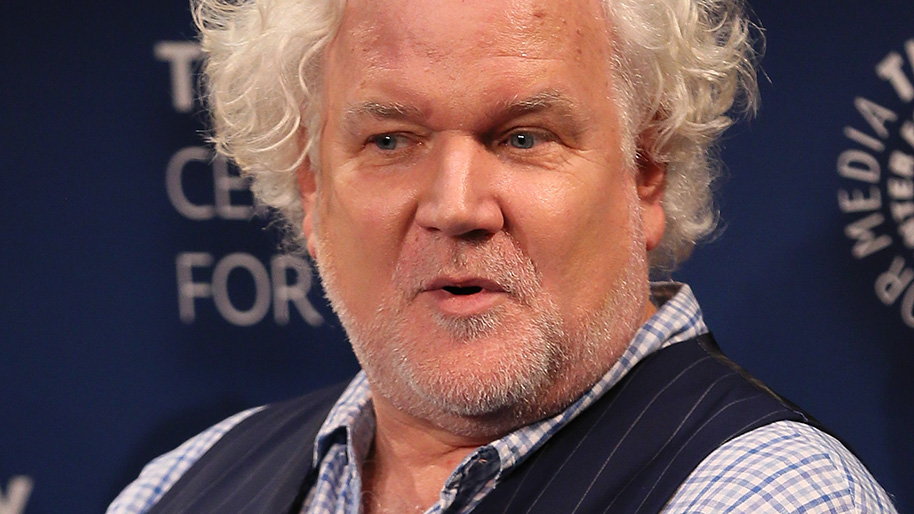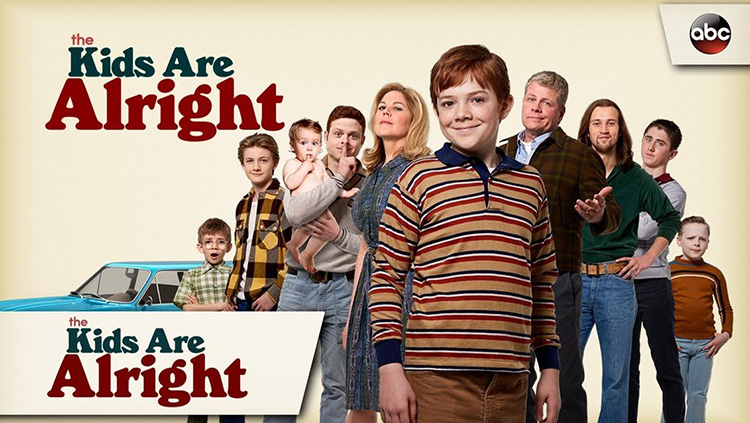Photo: The Kids Are Alright (ABC)
ABC’s The Kids Are Alright is inspired by the childhood of creator and executive producer Tim Doyle, who also narrates in voiceover as Timmy, one of the main character’s older selves. The ensemble comedy set in the 1970s follows a traditional Irish-Catholic family, the Clearys, as they navigate big and small changes during one of America’s most turbulent decades. In a working-class neighborhood outside Los Angeles, Mike (Michael Cudlitz) and Peggy (Mary McCormack) raise eight boisterous boys who live out their days with little supervision.
The newly-premiered ABC sitcom marks the first time Doyle, a veteran producer and writer with a stacked resume (The Big Bang Theory, Ellen, Better Off Ted, Grace Under Fire, Last Man Standing, Dr. Ken, and Rules of Engagement) is at the helm of a series he created himself. From the premiere alone, it’s clear that Doyle has something special on his hands.
Back From The Dead: ‘Fangoria’ is Alive and Printing
The pilot episode effectively (and sometimes chaotically) strikes a balance between heartwarming and funny while introducing the large ensemble cast of different personalities. The show also showcases the different parenting styles of Cudlitz’s Mike and McCormack’s Peggy. We spoke with Doyle over email about creating a show based on his own childhood and how he hopes his older audience will embrace the nostalgia while younger viewers can escape to an “exotic” time.

Mandatory: You have a long and impressive television career. What inspired you to create your own show and why was now the right time?
Tim Doyle: Well, in all these years it’s not as if I hadn’t tried to create my own shows prior to this. I have tried, again and again, probably writing 25 or 30 pilots and shooting about a dozen of them. They just never had the good fortune to go to series before. So the impulse to create my own show has been ongoing. The timing was dictated by circumstances; basically, a network saying “yes.”
The series is inspired by your own family and childhood. Did you really grow up with 10 people, three bedrooms, and one bathroom like the Cleary family?
This is largely true. The 10 people, eight boys part. Absolutely true. The three bedrooms thing, essentially true. Our house had three official bedrooms. However, at various times, a laundry room/kitchen and my father’s “den” doubled as bedrooms temporarily. The one bathroom thing is a bald-faced lie. We had two. But one was in pretty bad shape.
Personality-wise, how similar is the Cleary family to your own?
The process of making a show for network television is a process of compromise and collaboration, often in very good ways. You have something vivid in your head and just the act of writing it down, giving it the structure of words on paper, requires you to shape it and change it a bit. And every step of the way, the real stuff gets further removed from what works best in the storytelling and comedy. Casting, especially, shaped these characters. My mother became stronger, more confident, and a touch more sly once we found Mary McCormack to play her. Michael Cudlitz is a heightened version of my dad, more intimidating and outgoing, more blue collar. I would say that the character of Timmy is quite close to me in childhood. I was this over-eager jackass, desperate for attention and devoted to the idea of show business stardom. The other brothers are all composites of my actual brothers, changing and combining characteristics from them and from my own personality, largely to protect their anonymity. My brothers didn’t sign up to be characters on a sitcom. It seemed unfair to inflict that on them.
Are there moments in the pilot, like going to a children’s theater in glamourous 1970s Hollywood that sits between a porn theater and a Swedish massage building, that are based on actual events that happened to you?
A lot of stuff in the pilot is deadly accurate from my life. You picked a moment in the show, however, which varies a bit from the reality. I went into Hollywood often when I was a kid and this depiction of the massage parlors and sex shops is very accurate, but my trips weren’t for theater work but to visit the big magic shop on Hollywood Boulevard, to hang out and buy a few tricks. But I also did become active in local theater at this age, and my involvement often led me into awkward and unsavory circumstances — but not quite as depicted.
The first half of the pilot is fast-paced and a little chaotic, which does a good job of introducing the Cleary family. Was it your intention to give the opening that tone to reflect how chaotic this family’s life is?
Yes, I suppose. The ABC network and studio folks really seem to like a big vomit of exposition right at the top of their pilots. In my experience, they don’t have a lot of patience with the slow unfolding of information, but want to get to the “who” and the “where” done with fast, and then jump to the meat of the story. The voice-over and opening montage was a big help setting the stage before we get into Timmy and Lawrence and their issues. It seemed to work out in this case because, as you suggest, the initial chaos of all these kids unfolds over 21 minutes in such a way that by the end you get a pretty good sense of all nine principal characters.
How much prep went into making sure the set was ‘70s approved?
Our art department is fantastic and very conscientious. They did their research and we talked a lot, not only about getting the ‘70s right but about getting my version of the ‘70s — a version accurate to my family’s resources, peculiarities, and Catholicism. We are telling a story set in 1972, but this mom and dad have values still wedged in the 1950s, so our sets told that story as well. I cannot commend our art department geniuses enough.

Photo: Tony Rivetti (Getty)
There’s a scene where Michael Cudlitz’s Mike says the phrase “phony news.” Did you consciously try to show that not only were times different back in the 1970s but that in some ways things are still the same?
Sure. Part of our premise is that our show can use the past to comment on the present. The ‘70s were a different time but certain political and social themes are still surprisingly relevant. The “phony news” line is a little heavy-handed, but I wanted to test the waters on political themes, to see if this is a fun place to go for stories.
We thought it was a nice touch that you narrate as older Timmy in the pilot since you obviously relate to his character. Was that always the plan?
No. We had money in the budget to hire a known comedian or actor to play “Adult Timmy.” I read the part at the network table reading and also laid down the temporary voice track for editing. What I did seemed to work, I enjoyed doing it, and it occurred to people that it added a touch of authenticity, the guy telling the story is the guy telling the story, much like Woody Allen in Radio Days, or Jean Shepherd in the movie A Christmas Story, which were certainly big influences on this script. It also became a time-saver as we continued revising the voice over in the editing process. It eliminated a step for me to write a new line and just immediately lay it down.
More Exclusive Interviews: Tony Stella Talks About The Lost Art of Movie Posters
We love the music cue with Cream’s “White Room.” Was there a specific reason why this song was used over another?
Our director Randall Einhorn selected that cue. He has a much better sense of music than I do. He worked very [closely] with our composer on the scoring cues and chose the majority of the “needle drop” cues — cues of known songs which we licensed for the pilot. I think I just requested that he find something “badass.” Randall took it from there.
If there was a message or feeling you want your audience to walk away from after watching an episode of The Kids Are Alright, what would that be?
Well, the pilot has a very clear message about the struggle to be an individual in a situation where conformity is prized. And I think the series develops that idea further — and in surprising ways. In a family like the big one I grew up in, with limited resources, asserting your individuality and trying to be “special” is often a selfish act. Beyond that, I want to envelop the viewer in a warm hug of memory. People old enough can immerse themselves in something fond and familiar, and younger people can remove themselves to an exotic time of dial phones and photo processing — escaping our stressful present to a slightly-less stressful past.
‘The Kids Are Alright’ airs Tuesdays at 8:30 p.m. Eastern/7:30 p.m. Central on ABC.









![Sweet Magnolias EP on Why [Spoiler] Dies in Season 4](https://www.mandatory.com/wp-content/uploads/sites/10/2025/02/Sweet-Magnolias-Season-4-Death.jpg?w=282&h=188&crop=1)
